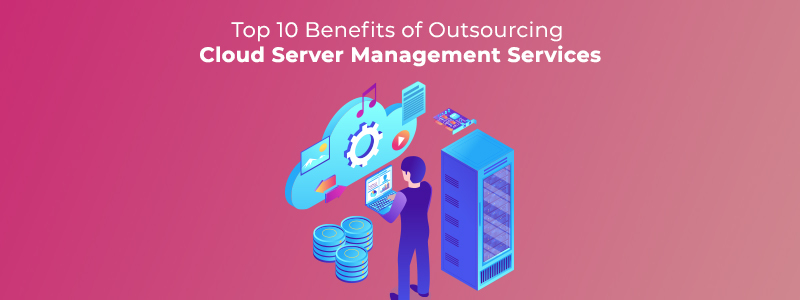There is a new gold in town: data. Today, most businesses use these clusters of information to run their operations, and they rely on cloud services to host data, applications, and services. Security threats, downtime, and data loss can be costly for businesses without effective cloud management. It may not be possible to fill these gaps in-house without extensive knowledge of cloud services. Therefore, outsourcing cloud management to a third-party service provider makes sense.
What is Cloud Management?
In cloud management, administrative control and oversight are maintained over cloud services and products. Administrators can manage various cloud operations through this process, including user activity, applications, services, and data. Cloud admins track and monitor different types of cloud activities, including data integration, usage tracking, resource deployment, and disaster recovery, with a variety of tools.
Cloud management involves a mix of strategies for ensuring security, monitoring performance, resolving complaints, and so on. Cloud models, operations, and IT services vary depending on the type of cloud, and there is no one-size-fits-all approach here.
Additionally, it involves managing tasks of a complex nature, such as providing fully functional software applications, maintaining resource availability, and implementing intricate security protocols. As a result, expert service providers often play a crucial role in well-rounded cloud management.
10 Benefits of Outsourcing Your Cloud Management
When managing your cloud services internally, you may need to consider collaborating with a third-party service provider. You can simplify the decision by outsourcing cloud management services by considering these 10 benefits:
1. Lower IT Costs
When compared to hiring in-house talent, businesses that require IT services can save money by using third-party providers. In exchange for low managed service subscriptions, the business has high employee costs.
2. Computing Resources
Extensive hardware resources are required for heavy computation cycles. By outsourcing computing to cloud services, you are able to take advantage of massive server farms. It almost cuts in half the amount of heavy computing resources needed!
3. Accessibility
Real-time access to several platforms is provided by cloud services. Mobile devices, tablets, and desktop computers are used by employees to access data. They are able to travel with incredible flexibility because of this. The work can also be split between workers at home and outsourced workers.
4. Always Updated
Continuous updates are a feature of dedicated cloud-managed services. In-house system updates are thus prevented from causing costly downtime. The software also delivers new features while patching exploits to ensure data security.
5. Scaling
In order to keep up with the increasing demand for hardware and software, businesses must invest in new equipment. As a result, there is typically limited space or slow rollouts associated with this costly investment.
Managed cloud services offer variable payment tiers. In this way, scaling costs can be kept low while appropriate resources can be provided when needed.
6. Backup/Recovery
A managed service cannot operate without up-time; otherwise, clients will flee. For clients and managed services, this includes regular data backups. Services are restored quickly during downtime by dedicated professionals.
Regular backups are also kept by dedicated services. When a major data disruption occurs, you’ll be able to recover quickly.
7. Integration
There is a wide variety of systems and software used by cloud services. Integrating their services with popular platforms & services is one of their primary goals. In addition to providing new service options, this also provides flexibility with existing tools and resources.
8. Security
In-house hardware and software that is unprotected or mismanaged poses a security risk. American businesses lose billions of dollars every year as a result of data intrusions and hacks. The security risk is mitigated when cloud-based services are used.
The network activity of cloud managed services is monitored by dedicated security teams. Due to their off-site location, these services also prevent physical attacks.
9. On-Demand
The majority of cloud services offer 24-hour technical support. If major problems arise during off-business hours, on-demand access provides assistance. It could also occur during major disruptions during peak workdays, such as service failures or system failures.
While they wait for IT professionals, businesses without dedicated IT could experience downtime. It does not take long for managed services to show the benefits of outsourcing IT during a disastrous disruption.
10. Focus
A dedicated IT team isn’t always feasible for many businesses. Focusing on critical operations could be compromised by including an IT team. When IT is outsourced, owners are able to focus on their core competencies.
A Futuristic Solution
Future-ready businesses will invariably rely on a variety of applications and programs to run their operations. When you outsource your cloud management services requirements, you avoid getting entangled in a constant cycle of troubleshooting. Let the professionals handle the technical stuff, so you can concentrate on growing your business.
















